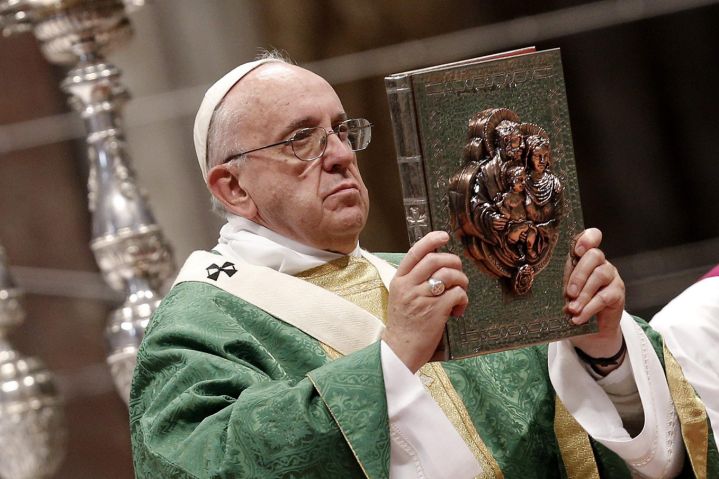If Pope Francis wants to preach inclusivity, he must accept the truly marginalised
Communities that were excited by the supposed liberalism the new pope are now feeling badly let down

Pope Francis has, inadvertently or purposefully, become the coolest Pope in a long time. He’s the pontiff who is big on environmental stewardship, tackling poverty, and bringing sex offenders in the church to justice. He’s a figurehead of the Holy See that you might want to go for a pint with. And for a BuzzFeed, Guardian and Slate-reading liberal agnostic like me, the media has optimistically seen him as the dawn of a golden age of the golden rule.
But for every moment the news thinks they can weedle a bit of pro-gay sentiment from Francis, there’s the mountain of anti-abortion, anti-queer quotes one could pull from his archives. He was explicitly pro-life during his America tour, and has compared trans people to nuclear weapons in a resurfacing quote. For all the times Pope Francis was the easiest Pope to share quotes from on Facebook he was still, unashamedly, a staunch Catholic.
Which is why the Synod on family, starting October 4th, does not fill me with hope: a chance for the Church to sit down and talk about family values feels more and more like another chance for queers or women or transfolk to be reminded we are still despised, shut out from a group who think they maybe somewhere read an explicit remark about how terrible we are. Sort of like how I think I once read a quote about how progressive the Pope had become, to be fair.
But while the revelations that the Pope sat down with both Kim Davis and a gay couple continue to confound all of us as to what he might actually believe about the family unit, it is a lot easier to see that if he truly wants the poverty-less world he preaches for, inevitably he must also preach for a world of equal opportunities too.
There is one quote- from his speech to the UN general assembly- that sticks out to me in this regard:
Economic and social exclusion is a complete denial of human fraternity and a grave offense against human rights and the environment. The poorest are those who suffer most from such offenses, for three serious reasons: they are cast off by society, forced to live off what is discarded and suffer unjustly from the abuse of the environment. They are part of today’s widespread and quietly growing “culture of waste”.
For a second, let’s ignore his other remarks about the need to ‘defend human life at every stage of its development’ or his cryptic description of there being too many different types of family unit, both said to congress. Instead let’s focus on this idea of fraternity and compassion, just as present in Washington when he decried the death penalty and called for America to take more refugees. This is a man who believes in equality, that ‘every creature… has an intrinsic value’, that ‘justice is an essential condition’, all remarks that are condensed in the above paragraph. The poorest suffer most, he says. We should not leave anybody by the wayside while any number of us march ahead into affluence and comfort.
I do not understand, then, how this man can say this and not support equality in ways he actively refuses to do. What is equal about agreeing with an anti-abortion stance, when adolescents are forced to carry children produced by rape? How can he support people not being left in this ‘culture of waste’, abused and without money, when trans people face high rates of unemployment and poverty and a disproportionate number of homeless youths identify as queer? How can you expect human fraternity when there is still mistreatment of women and queer people everywhere from Des Moines to India?
We cannot expect the Catholic Church to change overnight: it is too big a beast for one man to do such a thing. But there must come a point, if the Vatican wishes to continue on a bent of ending the ‘culture of waste’, that must lead to them seeing that inequality is a problem for more than just those the Catholic church accepts. I may have been deceived as to how progressive Francis can be, but his own words are still the best kicker I can find for this article: “reform and adaptation to the times,” he told the General Assembly, “is always necessary in the pursuit of the ultimate goal.”
Join our commenting forum
Join thought-provoking conversations, follow other Independent readers and see their replies
Comments